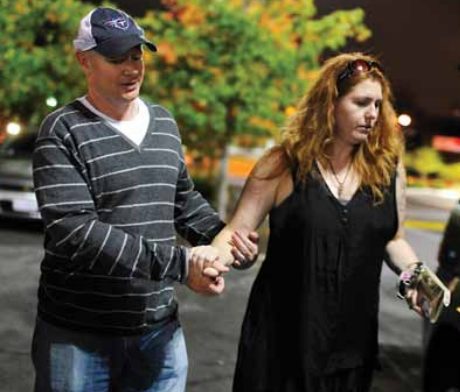They first met as soldiers.
“My first impression of her was as a peer, a good Army officer,” Kevin Polosky says of his wife, Christina, whom he met in the summer of 2002 when they were both attending the logistics captains course. He had no idea he would marry Christina someday. Neither was he aware of the great joys, terrible sorrows, and life lessons waiting for him in his future with Christina. What he did know was that this was a soldier with a future he wanted to stay connected with.
They parted ways after the class, but stayed in touch by email. Christina deployed to Iraq for the invasion the next year as a battle captain and Kevin followed a year later as a company commander. Christina’s job was performed mostly out of the back of a Humvee, while Kevin had an established forward operating base.
As Kevin puts it: “I was there longer, but her time in Iraq was tougher than my time there.”
While their relationship remained professional, Christina sent Kevin a care package with a little Christmas tree as a token of their developing friendship. That “touch of home in the sandbox” was much appreciated and prompted Kevin to connect with Christina in person after they were both stateside again.
That’s when they discovered a bond that had nothing to do with work. What they really loved was competition. It didn’t matter whether it was running 5K races together, playing golf, Wii bowling or Ultimate Frisbee. Competition with each other fueled them.
“I learned quickly Christina was one of those people who simply had to win, no matter what sport it was, and I greatly admired that” Kevin says.
In 2005, while driving to Fort Irwin in California, they decided on a whim to stop in Las Vegas to get married at the Graceland Chapel of Love. It was a second marriage for both, so “we thought maybe if we got to Elvis to help us out this time it would stick,” Kevin says with a laugh.
Three years later, both Kevin and Christina were deployed to Afghanistan when Christina developed an allergic reaction. Doctors are still puzzled by what triggered the reaction, but it only grew worse with time. First her face and tongue swelled up, then she lost her sight. Finally, Christina couldn’t breathe and collapsed in a life-threatening anaphylactic shock. Kevin vividly recalls that night.
“I got really scared. I was trying to figure out how to keep her breathing, to keep her talking,” says Kevin, “I was pleading with her. Praying. Yelling for someone to come help us.”
Christina was immediately medevaced to Landstuhl, Germany, and eventually sent home. While she’s recovered to a certain extent, her immune system was massively compromised by a still unknown contaminant. Today she is confined to bed two to three days a week, experiencing severe muscular and joint pain, debilitating fatigue, severe skin disorders on her hands and feet, cognitive issues, and bouts of deep depression.
Kevin did not handle the changes well at first.
“I got really angry with my wife for getting hurt,” Kevin says, frankly, “It was a really hard place to be in.” Then he realized those feelings weren’t helping anybody. “I realized I needed to stop feeling sorry for myself and stop being upset for something she had nothing to do with. She’s still my wife. She’s still the person I’m in love with.”
Acceptance is part of the solution, but it doesn’t ease the workload of a caregiver. Kevin remains active duty and now juggles his work at the Pentagon, his family, and his care for Christina. While the schedule is often demanding, Kevin says years of experience and a better relationship with God have given him the patience and wisdom to handle it.
“You have to do what needs to get done,” says Kevin. “There are no ‘roles’ anymore.”
Kevin also found tremendous help from a caregiver support group and Wounded Warrior Project (WWP). Kevin also found tremendous help from a caregiver support group and Wounded Warrior Project (WWP). There are not many male caregivers out there, so having that small pool of other men who can relate and provide feedback makes a world of difference, Kevin says. For Christina, the support from WWP has been critical because it recognizes the needs of female veterans, regardless of their injury.
“It’s a huge thing for her,” says Kevin, “to know there are other women who are suffering, too, and that her service is appreciated.”
It’s difficult looking back at the hopes and dreams they had at the beginning of their relationship and realizing that some will never come to pass. After a few years in limbo, however, Christina and Kevin are finding new things to appreciate as a couple. Christina, for instance, has found a purpose and a talent in art. She began attending painting classes and has found it so therapeutic that she’s now planning on teaching art to other female veterans.
“We understand the problems much better than we did five years ago and we have solutions that make everybody happy,” Kevin says. “That’s a good thing.”
This story was featured in the Winter 2013 issue of the After Action Report by the Wounded Warrior Project.












Follow Us